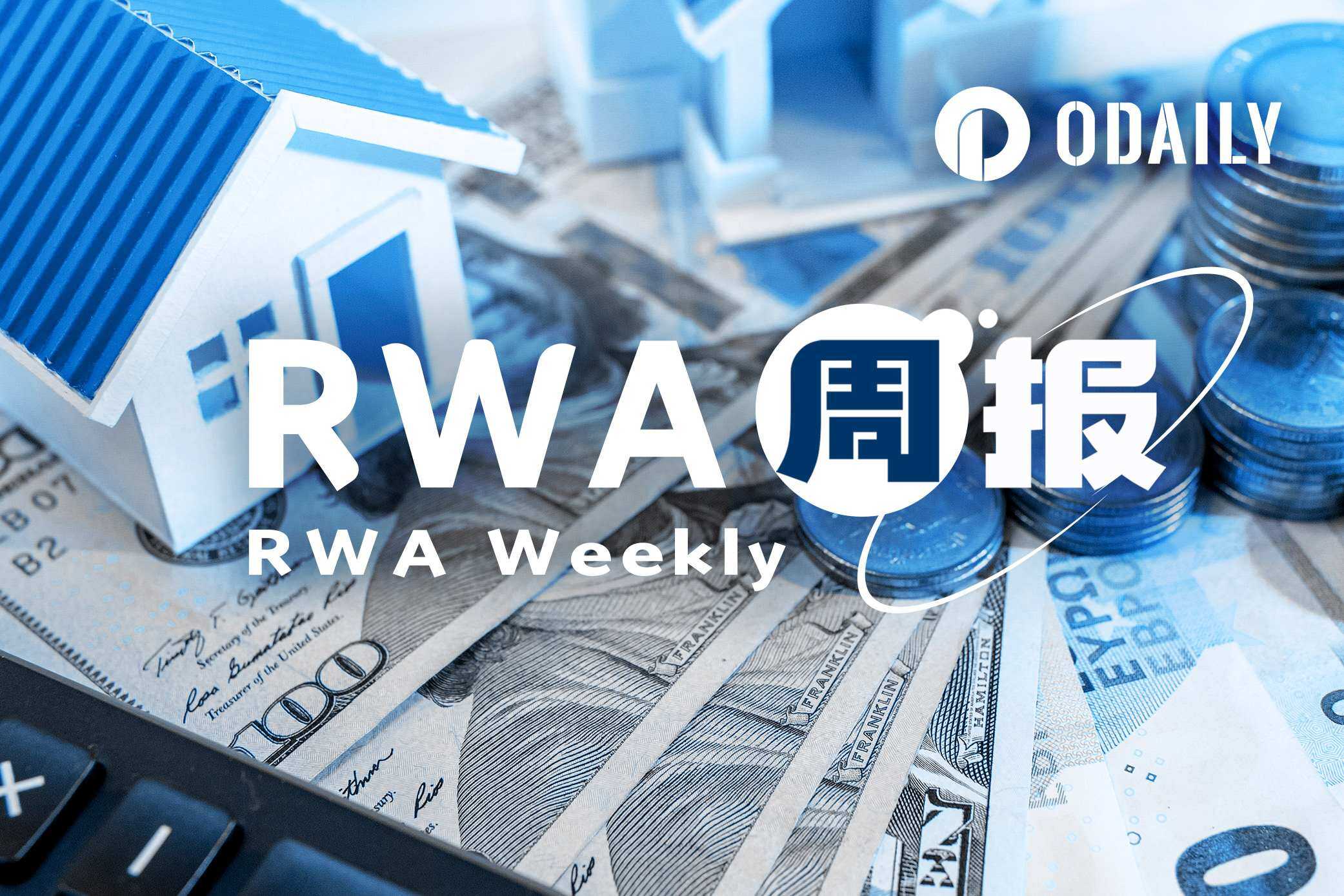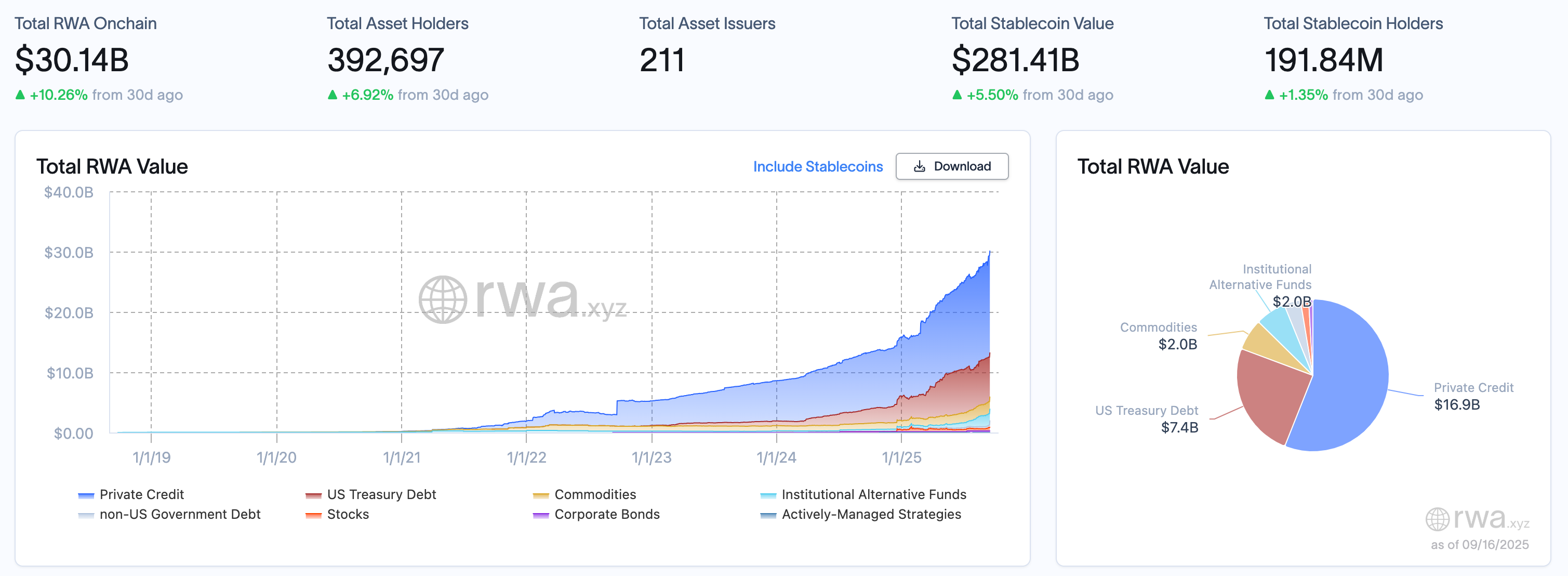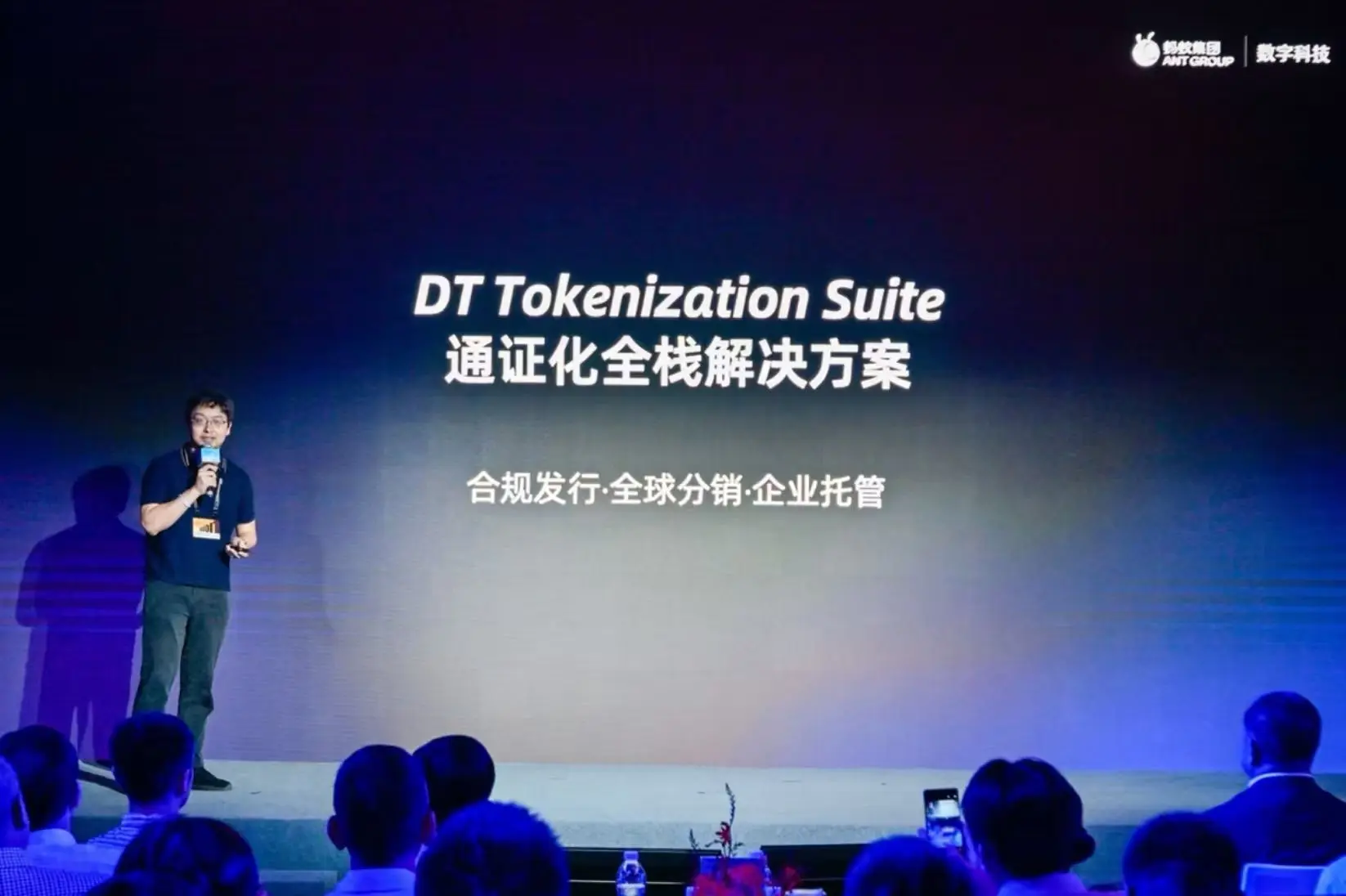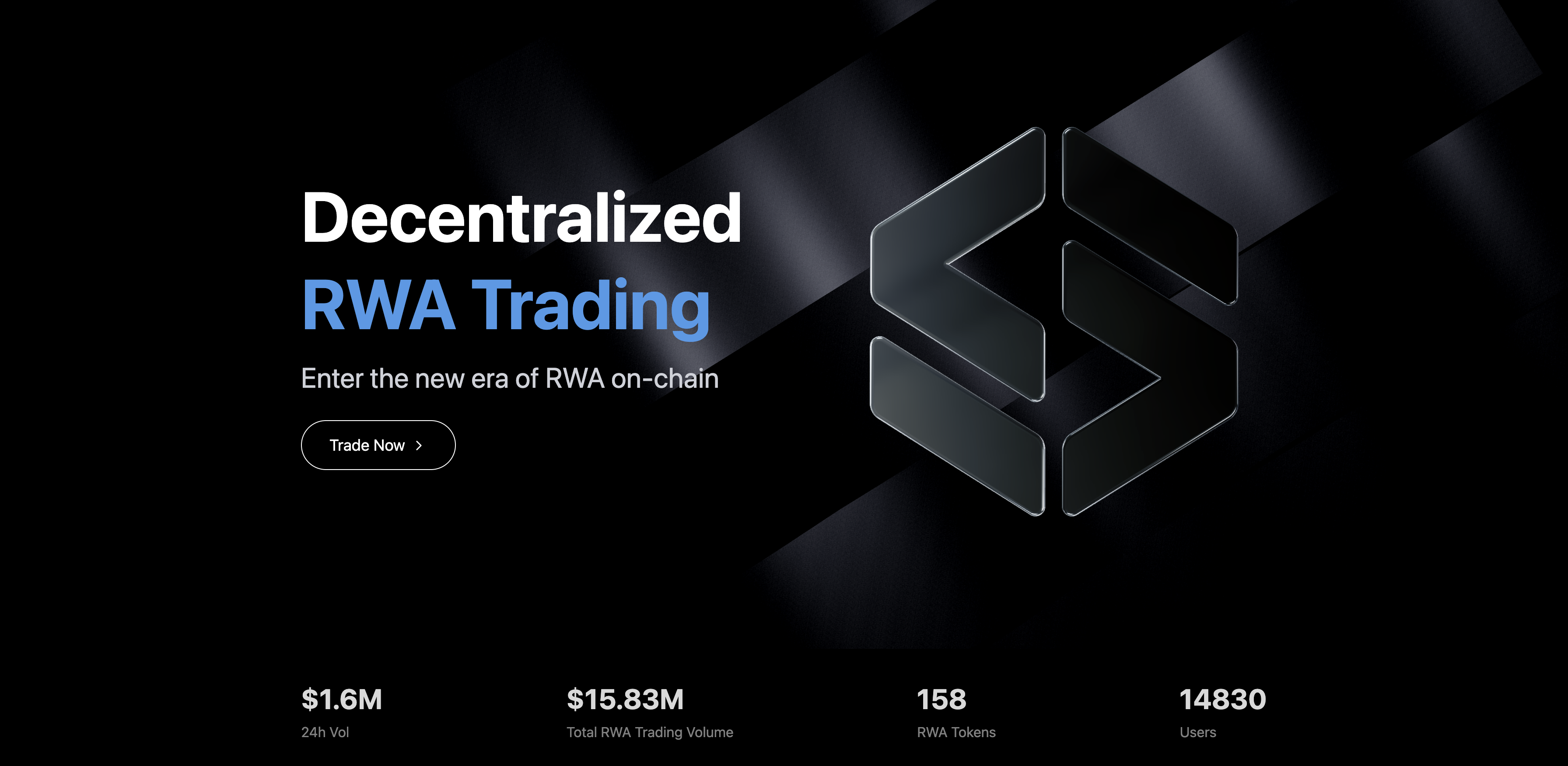Original | Odaily Planet Daily (@OdailyChina)
Author | Ethan (@ethanzhangweb3)_

RWA Market Performance
As of September 16, 2025, the total on-chain value of RWA is $30.14 billion, an increase of $2.34 billion from $27.80 billion on September 9, with a growth rate of 8.42%. This marks the first time the total market value of RWA has surpassed $30 billion, continuing the previous growth trend and entering a new phase of accelerated expansion. User participation has also risen, with the total number of asset holders increasing from 382,324 to 392,697, adding 10,373 new users in a week, a growth rate of 2.71%. This is the sixth consecutive week of positive user growth. However, the number of asset issuers has decreased from 274 to 211, a reduction of 63, representing a decline of 22.99%. This data is unusual and may be related to platform withdrawals or adjustments in statistical rules. (Speculation may be related to the weekend RWA indicator controversy; for details, see: 《$12 Billion of False Prosperity? The Dispute Over "RWA Data Fabrication" Between Figure and DefiLlama》) In the stablecoin market, as of September 16, the total value is $281.41 billion, an increase of $3.81 billion from $277.60 billion on September 9, with a growth rate of 1.37%. The number of stablecoin holders remained stable, rising slightly from 191 million to 191.84 million, an increase of about 8,400 people, with a change of less than 0.03%, indicating minimal overall fluctuation.
From the asset structure perspective, private credit continues to be the core of the RWA sector, accounting for about 56%, growing from $15.5 billion to $16.9 billion this week, an increase of $1.4 billion, with a growth rate of 9.03%. U.S. Treasury bonds remain stable at $7.4 billion for two consecutive weeks. Commodity assets continue to hold steady at around $2 billion, with no significant changes. Institutional alternative funds saw a slight increase this week, rising from $180 million to $200 million, an increase of 11.1%, indicating that institutional funds still have an interest in allocating to non-standard assets. Other asset categories such as stocks, non-U.S. government debt, and corporate bonds are relatively small in scale and have limited impact on the overall structure.
What are the Trends (Comparing to Last Week)
From the overall market trend, the RWA market showed a combination of "volume breakthrough + structural stability" in the second week of September. On one hand, the total market value of RWA has surpassed $30 billion for the first time, with both private credit and alternative funds rising, providing strong support for the total value increase. On the other hand, the stablecoin market performance has stabilized, with user activity remaining largely unchanged, indicating a more mature capital structure. The significant decline in the number of asset issuers may be an anomaly in the data, or it could reflect that the platform is promoting project centralization or redundancy management.

Key Events Review
Tether to Launch U.S. Domestic Stablecoin USAT, Appoints Bo Hines as CEO
According to official news, Tether has officially launched USAT, a dollar-backed stablecoin planned to be issued under the U.S. regulatory framework, and has appointed Bo Hines as the future CEO of Tether USAT.
USAT will strictly adhere to the regulatory standards of the U.S. "GENIUS Act," supported by transparent reserves, aiming to provide a digital alternative to cash and traditional payment systems for businesses and institutions. This stablecoin will utilize Tether's Hadron technology platform, with federally regulated crypto bank Anchorage Digital as the compliant issuer, and Cantor Fitzgerald serving as the designated reserve custodian.
Tether CEO Paolo Ardoino stated that the launch of USAT is a natural step to ensure the dominance of the dollar in the digital age. Bo Hines previously served as the executive director of the White House Crypto Council and possesses expertise in law, business, and policy.
U.S. Senate Democrats Unveil Crypto Market Regulatory Framework, Pushing for Bipartisan Negotiations
On September 9, 12 Democratic senators introduced a seven-pillar regulatory framework for the crypto market, the most comprehensive intra-party proposal to date. The plan aims to enhance investor protection, fill regulatory gaps, and limit potential corruption, specifically naming crypto projects involving Trump and his family. The core of the framework includes: granting the Commodity Futures Trading Commission (CFTC) new powers over the spot market for non-security tokens, establishing a mechanism for determining security tokens; imposing disclosure and compliance requirements on issuers, exchanges, and custodians; requiring digital asset platforms serving U.S. users to register as financial institutions, subject to the Bank Secrecy Act and anti-money laundering regulations; and proposing new supervisory tools for potential illegal financial risks in DeFi. Additionally, the proposal prohibits stablecoin issuers from directly or indirectly paying interest and bans current officials and their families from issuing or profiting from crypto projects. This move lays the groundwork for negotiations with the Republican "Clarity Act," but there are significant differences between the two parties on ethical terms and DeFi regulatory attitudes.
Institutional-level tokenized real-world asset (RWA) exchange DigiFT announced today that its joint project with industry-standard oracle platform Chainlink and UBS's internal tokenization service UBS Tokenize has been approved for funding under the Hong Kong Digital Port Blockchain and Digital Asset Pilot Funding Program.
DigiFT, Chainlink, and UBS are developing a regulated blockchain infrastructure aimed at automating and simplifying the distribution, settlement, and lifecycle management of tokenized products, reducing human errors and saving costs. As part of the project, DigiFT is validating the infrastructure and providing commercial feedback to ensure the system meets compliance, scalability, and interoperability requirements for Hong Kong financial institutions.
Yunfeng Financial Group announced a placement of a total of 191 million new shares at a price of HKD 6.1 per share, raising approximately HKD 1.17 billion. This placement aims to expand the company's shareholder and capital base and increase the liquidity of the company's shares in the market. The raised funds will primarily be used for system facility upgrades, talent recruitment, and related capital needs, including but not limited to launching comprehensive virtual asset trading services and virtual asset-related investment management services.
Previously, Yunfeng Financial allocated $44 million to purchase 10,000 ETH as reserve assets and has received approval from the Hong Kong Securities and Futures Commission to provide virtual asset trading services. The board has also appointed Mr. Liang Xinjun, co-founder and executive of Fosun International, as an independent non-executive director.
Ant Group Announces Establishment of Ant Chain Trust Company
According to official news, Ant Group and Longxin Technology Group jointly announced the establishment of "Ant Chain Trust," which will leverage core technologies such as blockchain, IoT, and AI to develop products and services for green asset management, dynamic rating pricing, and build a full-chain service platform covering "asset on-chain - data aggregation - asset management - rating pricing."
Previously, Ant Group released the DT Tokenization Suite to assist in the standardization and scaling of RWA development

Figure Announces IPO Pricing at $25 per Share
Blockchain-native lending company Figure Technology Solutions, led by SoFi co-founder Mike Cagney, announced its initial public offering (IPO) pricing on Wednesday evening: issuing 31,500,000 shares of Class A common stock.
The company set the offering price at $25 per share—higher than the previously disclosed range of $20 to $22 per share in the S-1 filing submitted to the U.S. Securities and Exchange Commission (SEC) earlier that day.
At the announced price, Figure plans to raise $787.5 million through the IPO (previously estimated at $693 million), with a company valuation of approximately $5.3 billion (previously $4.7 billion). After the offering is completed, approximately 211.7 million shares of Class A and Class B common stock will be outstanding, excluding the underwriters' over-allotment option.
This offering includes 23,506,605 shares of Class A common stock issued by Figure and 7,993,395 shares of Class A common stock sold by certain existing shareholders. This represents an adjustment from the previous filing, which indicated 26,645,296 shares and 4,854,704 shares, indicating a change in the offering structure. Figure will not receive any proceeds from the shares sold by existing shareholders.
Gemini Raises $425 Million in IPO, Selling Approximately 15.2 Million Shares at $28 Each
According to Bloomberg, cryptocurrency company Gemini Space Station Inc. (referred to as Gemini) has raised $425 million through its initial public offering (IPO), with its offering price exceeding the proposed range and reducing the offering scale.
Anonymous sources familiar with the matter stated that Gemini, led by billionaire twins Winklevoss, sold approximately 15.2 million shares at a price of $28 each on Thursday, up from the proposed price range of $24 to $26 per share. Bloomberg previously reported that the company informed investors on Thursday that it planned to set the IPO base size limit at $425 million, anticipating a double-digit oversubscription.
The prospectus shows that Nasdaq has agreed to privately purchase $50 million worth of shares at the IPO price. Gemini will reserve up to 10% of the IPO shares for long-term users, management, employees, and family and friends, and allocate up to 30% of the shares to retail investors participating in the subscription through self-directed investment platforms such as Robinhood Markets Inc., SoFi Technologies Inc., and Webull Corp.
China New City Group Partners with EX.IO to Launch Commercial Real Estate RWA
Hong Kong-listed China New City Group Limited (1321.HK) has announced a strategic partnership with the licensed virtual asset trading platform EX.IO to jointly issue RWAs that combine commercial real estate projects with digital assets.
The underlying assets of this issuance include two parts: high-quality commercial real estate in China and mainstream virtual assets with certain growth potential. The commercial real estate is located at Zhong'an Times Square in Hangzhou, Zhejiang Province, which has maintained a high occupancy rate and stable foot traffic over the long term, attracting quality brand tenants with outstanding asset quality and revenue capability. By adding mainstream virtual assets to the portfolio, it will provide global investors with a secure and attractive asset allocation option.
It is reported that China New City Group has transformed into a digital asset management company. The group will fully utilize cutting-edge technologies such as blockchain, artificial intelligence, and the Internet of Things to achieve digital transformation of cross-domain assets in real estate, green finance, and cross-border trade, building a new digital real estate ecosystem.
EX.IO, a licensed virtual asset trading platform invested by Sina's Huasheng Group, received its license from the Hong Kong Securities and Futures Commission in December 2024. Its core team comes from international financial institutions such as Société Générale, Morgan Stanley, and HSBC, combining deep traditional financial experience with blockchain innovation capabilities.
Hot Project Updates
Ondo Finance (ONDO)

One-Sentence Introduction:
Ondo Finance is a decentralized finance protocol focused on structured financial products and the tokenization of real-world assets. Its goal is to provide users with fixed-income products, such as tokenized U.S. Treasury bonds or other financial instruments, through blockchain technology. Ondo Finance allows users to invest in low-risk, high-liquidity assets while maintaining decentralized transparency and security. Its token ONDO is used for protocol governance and incentive mechanisms, and the platform also supports cross-chain operations to expand its application scope in the DeFi ecosystem.
Latest Updates:
On September 10, Ondo Finance officially announced that Peter Curley has joined the company as the Global Head of Regulatory Affairs. He has decades of experience in financial policy, with a background that includes: Senior Policy Advisor at Coinbase, Senior Advisor for Financial Institution Policy at the U.S. Department of the Treasury, Deputy Director at the U.S. Securities and Exchange Commission, and Head of Strategy and IPO Regulation at Hong Kong Exchanges and Clearing Limited.
On September 12, according to on-chain data, Ondo Global Markets ranked first in total locked value (TVL) in the tokenized stock sector, with $126.85 million, surpassing the total of other platforms combined. xStocks and Dinari ranked second and third with $48.66 million and $45.42 million, respectively.
MyStonks (STONKS)

One-Sentence Introduction:
MyStonks is a community-driven DeFi platform focused on tokenizing U.S. stocks and enabling on-chain trading. The platform partners with Fidelity to achieve 1:1 physical custody and token issuance, allowing users to mint stock tokens like AAPL.M and MSFT.M using stablecoins such as USDC, USDT, and USD 1, and trade them on the Base blockchain around the clock. All transactions, minting, and redemption processes are executed by smart contracts, ensuring transparency, security, and auditability. MyStonks aims to bridge the gap between TradFi and DeFi, providing users with a high-liquidity, low-barrier entry into U.S. stock investments on-chain, building "the NASDAQ of the crypto world."
Latest Updates:
On September 12, according to MyStonks' announcement, the "STONKS token staking and airdrop plan" was approved by the community with a 98% support rate, and the platform has officially launched the token staking program. The staking period is from September 12 to September 22, 2025, lasting 10 days, with a lock-up period of 180 days. Users need to connect their wallets, log into their personal center, and click the "Stake" button to complete the operation without needing to recharge. Users who do not participate by the deadline will not be able to make up for the staking.
On September 16, the MyStonks platform officially launched Hong Kong stock contract trading, allowing users to participate in trading directly using wallets through USDT/USDC, with a maximum leverage of 20 times. This launch includes several quality Hong Kong stocks, including Cathay Securities International (1788.HK), BYD Company Limited (1211.HK), Xiaomi Group (1810.HK), Mixue Group (2097.HK), Meituan (3690.HK), Tencent Holdings (700.HK), Pop Mart (9992.HK), JD Group (9618.HK), and Semiconductor Manufacturing International Corporation (981.HK), covering multiple industries such as technology, automotive, retail, internet, and semiconductors, meeting users' diverse asset allocation needs.
Related Links
Sorting out the latest insights and market data in the RWA sector.
A confrontation over RWA transparency and data standards reveals a larger cover-up.
《The New Landscape of Public Chains Driven by Stablecoins and RWA》
The next chapter of public chains will be written by those platforms that can truly serve the real economy and reduce friction in value transfer.
《Figure's Founder Believes DeFi Will Eventually Become the Mainstream Method for Asset Financing》
Blockchain has fundamentally reshaped how assets are initiated, traded, and financed. This is not a fintech transformation that merely "paints lipstick on a pig," but a brand new capital market ecosystem.
《RWA In-Depth Research Report: On-Chain IPOs and Recombination of Real-World Assets》
Why is it said that the on-chain finance is a top-level national strategy and market trend in the United States?
免责声明:本文章仅代表作者个人观点,不代表本平台的立场和观点。本文章仅供信息分享,不构成对任何人的任何投资建议。用户与作者之间的任何争议,与本平台无关。如网页中刊载的文章或图片涉及侵权,请提供相关的权利证明和身份证明发送邮件到support@aicoin.com,本平台相关工作人员将会进行核查。




